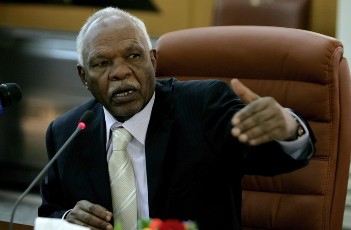Sudan admits impact of Heglig crisis on economy
April 15, 2012 (KHARTOUM) – The Sudanese government has finally acknowledged the economic ramifications of losing oil-producing area of Heglig to South Sudan’s army, revealing measures to remedy the situation.

The takeover of Heglig has caused panic in the Sudanese street over the potential scarcity of fuel and further lowered the value of the local currency against the US dollar on the black market.
On Sunday, however, two Sudanese officials spoke with realism on the potential effects of losing Heglig’s oil and the actions being considered to tackle them.
Sudan’s oil minister Awad Ahmad al-Jaz admitted that the country is facing an increased financial crisis due to the loss of Heglig’s oil. In order to counter this, he revealed that the government is planning to export existing supplies of oil currently stores in Port Sudan, the country’s outlet on the Red Sea.
He also said Sudan could resort to importing oil in order to cover the deficit should the current situation in Heglig persist.
Furthermore, the secretary of economic affairs at the ruling National Congress Party (NCP), Sabir Mohamed Al-Hassan, told reporters in Khartoum on Sunday that the events in Heglig had affected the government’s income and led to budget shortages.
Sabir said that the existing amounts of oil are enough for the country until Heglig is re-taken. However, he added the situation nonetheless requires great reduction in government spending without affecting staff salaries.
He went on to reveal that some political arrangements are being made by influential state officials to secure financial backing from abroad.
Meanwhile, the Sudanese minister of finance, Ali Mahmoud, on Sunday said that his ministry has started to replace the current budget which, he said, has become inapplicable against the background of losing the prospect of fees to transport South Sudan’s oil.
Sudan lost an estimated output of 350,000 barrels of oil per day when South Sudan seceded in July last year. This loss was made worse by Juba’s decision earlier this year to stop exporting its oil through Sudan’s pipelines after failing to agree with Khartoum on a fair transit charge.
Over the last two days the Sudanese pound has continued to slide further against the US dollars on the black market, dropping to a record low of 6.2 per one dollar, while the official rate remained at 3 Sudanese pounds per one dollar.
Sabir accused some currency traders of taking advantage of the panic precipitated by Heglig crisis by buying the dollars available in the market and selling them the next day at a higher price.
The head of the economic committee at the Sudanese parliament, Al-Zubair Ahmad Al-Hassan, revealed on Sunday that an agreement had been made between the Ministry of Finance and the Central Bank of Sudan to put in place measures and policies that would lead to stabilising the exchange rate and curbing inflation.
Al-Hassan further explained that according to these plans, the central bank would play a greater role in containing the rise of the dollar value in the black market.
He added that the measures being taken by the central bank include greater control of the money supply and pumping additional amounts of foreign currency into banks as well as providing new incentives to exporters to redouble their activities.
(ST)
